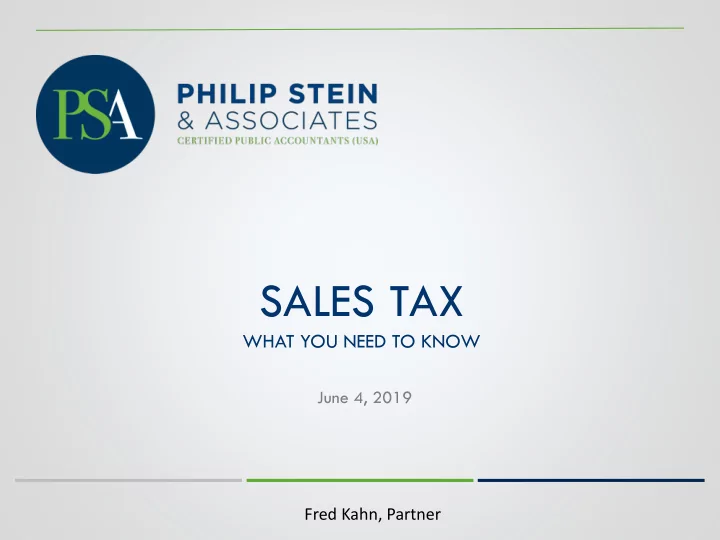

SALES TAX WHAT YOU NEED TO KNOW June 4, 2019 Fred Kahn, Partner
What is Sales Tax? o Sales tax is a consumption tax imposed by the Government government on the sale of certain goods and Sales tax services. o Although the additional cost Retailer is borne by the consumer, the retailers are responsible for Sale price collecting and remitting to + sales tax the state taxation authority Consumer on a regular basis. 2
Sales Tax Rates across the USA 3
When does sales tax apply? Sales tax is imposed on a state by state basis if a sale meets all three of the following criteria: o Nexus – the company has some connection to the state in which the purchaser is located; o Taxability - the product or service is taxable in that state; o End user - sales must be retail sales to an end user in the state. 4
Nexus – physical presence Sales tax nexus occurs when your business has some kind of connection to a state. Some common examples of physical presence: office employee warehouse storing inventory Note that the physical presence thresholds for sales tax are lower than for income tax purposes. Temporarily doing physical business in a state for a limited amount of time may be sufficient to trigger sales tax nexus in the state. (i.e. a trade show, or employee performing services at customer location) 5
Nexus – economic presence o South Dakota vs. Wayfair On June 21, 2018, the US Supreme Court issued a ruling which eliminates the physical presence requirement for sales tax. A company is considered to have sales tax nexus with the state when it “ avails itself of the substantial privilege of carrying on business ” in a jurisdiction. o No bright-line test was determined. o South Dakota’s economic nexus thresholds were upheld: $100,000 in sales; or 200 transactions 6
Nexus – economic presence (cont.) More than 35 states have passed economic nexus laws. Most are based on South Dakota’s legislation, but vary with regard to: • Thresholds • Effective date of legislation • Sales which serve as basis for threshold • Period which serves as basis for threshold 7
Taxability As a general rule, tangible products are taxable and most services are not. However, each item sold must be considered carefully to determine taxability in all relevant states . o Five states (New Hampshire, Oregon, Montana, Alaska, and Delaware) do not impose any statewide sales tax. o Four states (Hawaii, South Dakota, New Mexico, and West Virginia) tax services by default, with exceptions only for services specifically exempted in the law. o The remaining 41 states — and the District of Columbia — do not tax services by default, but services enumerated by the state may be taxed. 8
Taxability – software Software and digital products must be analyzed to determine the precise product definition. States have varying opinions as to whether these are considered tangible products or services, with nuanced details that may affect the taxability. For example: • Custom or canned software • SAAS / “cloud computing” • Medium of delivery (tangible or electronic) • Maintenance and support 9
Taxability - exemptions If you make a taxable sale in a state in which you have nexus, you are required to collect sales tax on any order delivered to that state unless a valid exemption is applied. Common exemptions: Type of item sold o Medical devices o Necessity items (food, clothing) Type of purchaser o Government agencies o Hospitals, non-profit organizations o Direct pay permits Exempt organizations must provide an exemption certificate. 10
End user o The most common exemption is a resale exemption. Goods Wholesaler purchased to be resold in the same form in which they are Sale price + reseller purchased qualify for a resale certificate exemption. When that reseller Sales tax Retailer later sells the goods, they are required to collect sales tax on the Government Sale price full selling price of the product. + sales tax o States that allow for resale exemptions either accept a state Consumer issued resale certificate or, in some cases, a multi-state certificate. 11
What does this mean for my business? o Nexus analysis & mapping exposure o Define customer type o Define the product/s o Taxability research o Action items: Sales tax added to invoice based on ship-to address Registration with state Sales tax filings Periodic economic nexus analysis check 12
Remote sellers o International sellers Economic nexus rules apply to foreign sellers as well. o Marketplace facilitators Marketplace Facilitator legislation is a set of laws that shifts the sales tax collection and remittance obligations from a third party seller to the marketplace facilitator. To date, twelve states have passed such legislation. o Fulfillment by Amazon (FBA) Inventory stored in Amazon Fulfilment Centers creates physical nexus in the state. To date, Amazon has FCs in more than 25 states. Third party sellers do not have control over which FCs their product are stored in, creating potential nexus in many states. 13
Drop-shippers Retailer Invoice/ Sale for sale resale Third-party Customer supplier Delivery of product 14
Use Tax o Use tax is a sales tax on Out-of- purchases of taxable items that state Retailer will be used, stored or Sale of consumed in a state and upon taxable which no tax was collected in product End user - the state of purchase. Consumer o Use tax is self-assessed and Use tax remitted by the end consumer. o The use tax rate is the same as Government the sales tax rate (state and local). 15
THANK YOU
Recommend
More recommend